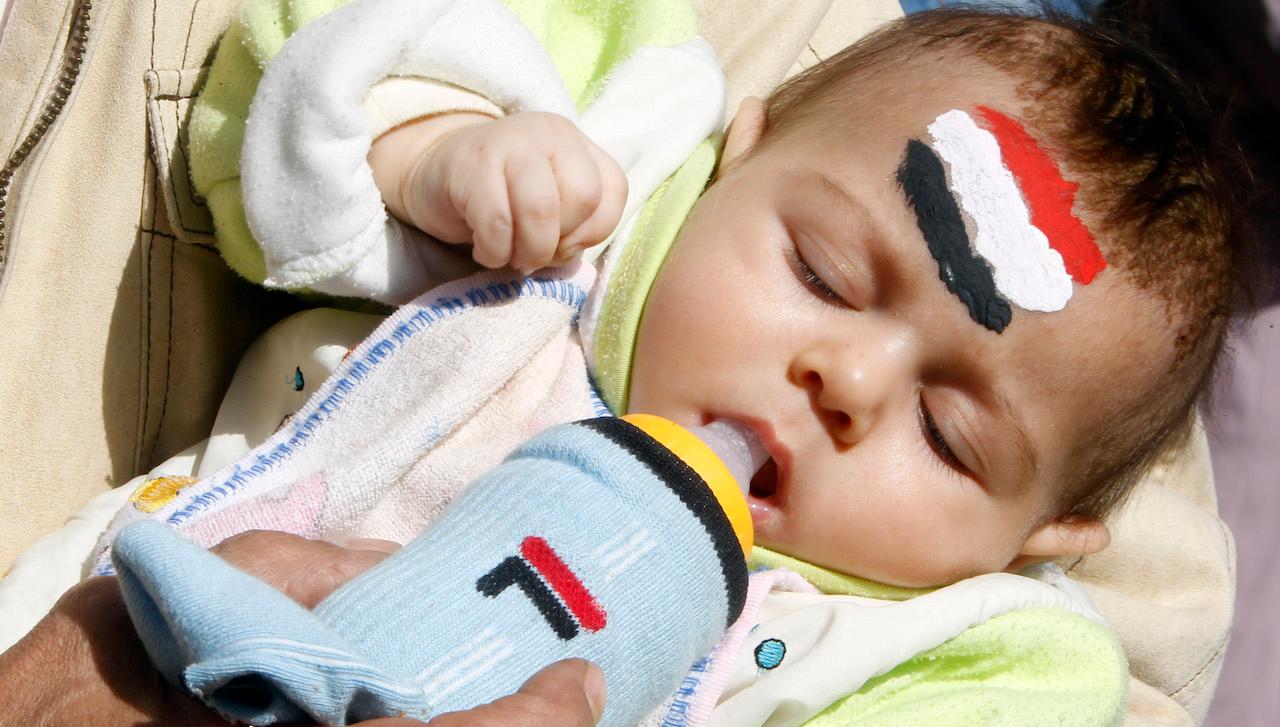Egypt is requiring breast exams for women seeking subsidized baby formula
A baby whose forehead has been painted with the colors of the Egyptian flag drinks from a bottle at a pro-democracy rally in Cairo on March 4, 2011.
In recent weeks, the Egyptian government has been preparing its citizens for a period of austerity designed to ease the national debt.
Billboards around the country urge Egyptians to "rationalize our consumption, reduce our imports," trying to sell the public on market reforms linked to an International Monetary Fund loan.
It’s not working too well. In fact, outrage is mounting, particularly over the rationing of one treasured commodity: baby formula.
A 13 percent devaluation of the Egyptian pound has been underway for a year. Led by a slump in tourism, the country’s trade deficit has skyrocketed from $9.5 billion before the 2011 revolution to $45 billion today.
At the same time, the government is on the verge of signing a $12 billion loan from the IMF. The deal will require a massive reduction of Egypt’s trade deficit and other cost-saving measures.
Enter baby formula, which costs this nation $51 million annually in scarce foreign currency reserves. In August, Egypt began strictly limiting access to subsidized formula — causing market prices to surge.
Near one austerity billboard, a rare protest broke out earlier this month over the new rules.
“We are poor — the children have the right to have milk,” said Abu Samir, an unemployed construction worker and father of five-month-old twins in Cairo. “Some mothers are now using water and sugar to feed their children because of the price hikes.”
On top of that, the government is actually mandating breast exams for women seeking formula. New mothers in hospitals were the first to get the exams last month, intended to prove their need for extra milk.
This measure symbolizes, some say, a depraved regime that disrespects women.
"Let me now remind you of Sisi's words when he said Egyptian women will not be molested,” said Hamza Zawba, a former spokesman for the Muslim Brotherhood’s Freedom and Justice Party, in commentary aired on a Brotherhood TV station beamed into Egypt from Turkey.
“Sisi said he would not let them end up in boats in the sea like Syrian women," he added. "But he will let them expose their breasts to a soldier or a doctor to see if they have milk or not!"
The ministry rejected claims that women not already in hospitals would have to undergo public examinations, saying the formula eligibility checks will take place privately in mobile health clinics. They said they have rolled out a “smart card” system for synthetic milk similar to the device given to indigent families receiving government food assistance.
Adding insult to price hikes
The demonstrators who gathered earlier this month — outside the headquarters of the Egyptian Pharmaceutical Trading Company, a state-owned firm in Cairo — said that the government was erecting obstacles to their children’s survival by restricting the distribution of subsidized formula to just over a thousand government-run pharmacies in this country of more than 90 million people. There are about 60,000 privately owned pharmacies in Egypt.
At the Health Ministry’s headquarters near Tahrir Square, spokesperson Khaled Megahed said the breast examinations were part of a series of new rules to prevent “leakages” in the supply of subsidized formula — namely the black market that has developed around the product.
Nursing mothers say they are paying the price for the government’s inability to stop the illicit trade in baby milk.
“They told us that life would become more expensive but instead, it has become insulting and exhausting,” said protesting mother Um Mahmoud, 28, in Cairo. “I go from pharmacy to pharmacy, and I’m told there is no milk for less than $6 a unit.”
Those $6 units are 28 ounces each. The average breadwinner in Egypt brings home just over $100 per week, according to the government.
Earlier this month, the Al-Haqaneya Association for Rights and Freedoms, a civil rights group, filed an appeal with the government claiming the new formula rules violate child welfare and protection clauses in Egypt’s constitution.
“There is definitely a tightening of the rules with eligibility for the formula subsidy limited to women who have twins, have breast defects or suffer from a chronic disease,” said Dalia Abd El–Hameed, a gender researcher at the Egyptian Initiative for Personal Rights.
“We are monitoring the breast exams issue but so far, we have no reports of abuse related to this rule and new mothers.”
How much is too much formula?
In response to the protests, this week Egypt’s army — eager to prevent unrest and maintain its place at the center of society — stepped into the infant formula business, as well.
“Citizens must realize that the armed forces exert all efforts to ease the burden on ordinary people,” said military spokesman Mohamed Samir, who announced that Egypt’s army had signed a contract with a French firm to import baby formula.
The military said it would sell the formula at a price of around $3 a unit instead of the $6 market price.
Still, the government is getting support for its measure from an unexpected quarter. Maternal and child health specialists, as well as the UN children’s agency, believe the government has good reason to limit the use of infant formula, unrelated to austerity.
“There is a need to better inform mothers and communities on the importance of breastfeeding for their child’s survival and mental and physical development,” said Bruno Maes, UNICEF’s Egypt representative.
The agency says fewer than one-third of children in Egypt aged 4 to 5 months are exclusively breastfed.
“The formula companies have done too good a job in marketing their product,” said Salma Ramadan, a pediatrician at Helwan General Hospital. “Many new mothers are not interested in hearing what we have to say about breastfeeding and start asking for the cans of subsidized milk even before they give birth.”
